About five years ago, I read two books that knocked my socks off — the exquisitely evocative Song of Solomon by Toni Morrison and that massive, epic, beautiful whale of great literature, Moby Dick by Herman Melville.
I came to read them because, back in the spring of 2016, a friend recommended a book that had nothing directly to do with either: How to Read the Bible by Harvey Cox.
The story of how the Cox book led to Melville’s big fish and Morrison’s Song is an illustration of that little-recognized thing that happens among readers — the way the recommendation of one book has a ripple effect and leads to the reading of other books which lead to other books.
In fact, in a three-year period after How to Read the Bible was suggested to me, it led me to a total of 27 books, immensely enriching my reading experiences.
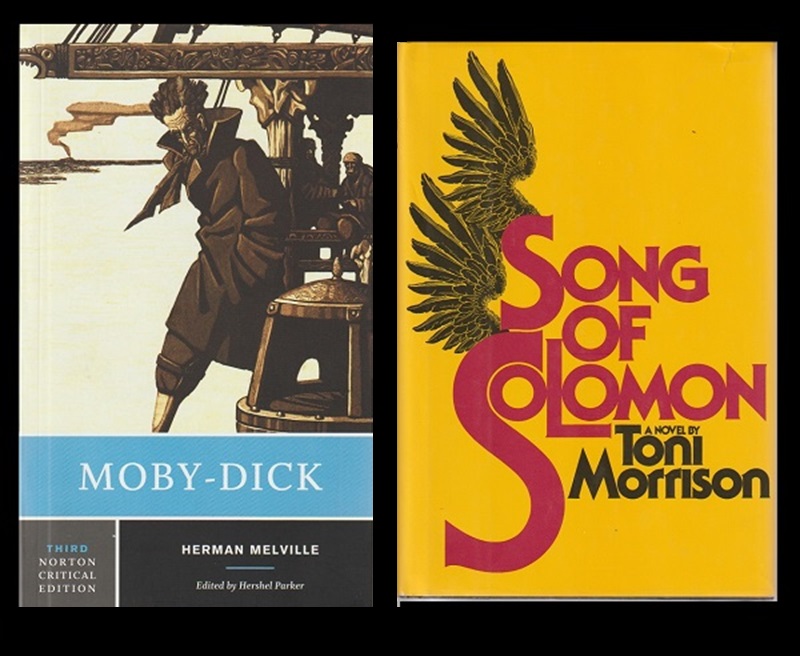
A delightful journey
Think about it. When you suggest a book to someone, it can send that someone on a delightful and unexpected literary journey of great value.
Maybe I give you a copy of Memento Mori by Muriel Spark, and you like it so much to go on the read all of her other novels. That’s the simplest example of this. The odds are, though, that you won’t just read her stuff. You’ll also be attracted to writers who are described as being like her or writing in the same post-war Britain or by authors whose paths crossed hers.
In a way, that’s what happened to me but with a focus on subject matter rather than writer.
Biblical books as literary works
The recommendation of How to Read the Bible came during a random conversation with my friend, Father Dominic Grassi who, at the time, was the pastor of our Catholic parish. I’d always had an interest in the Bible, plus I was intrigued that Cox, a highly popular author in the 1960s, was still writing.
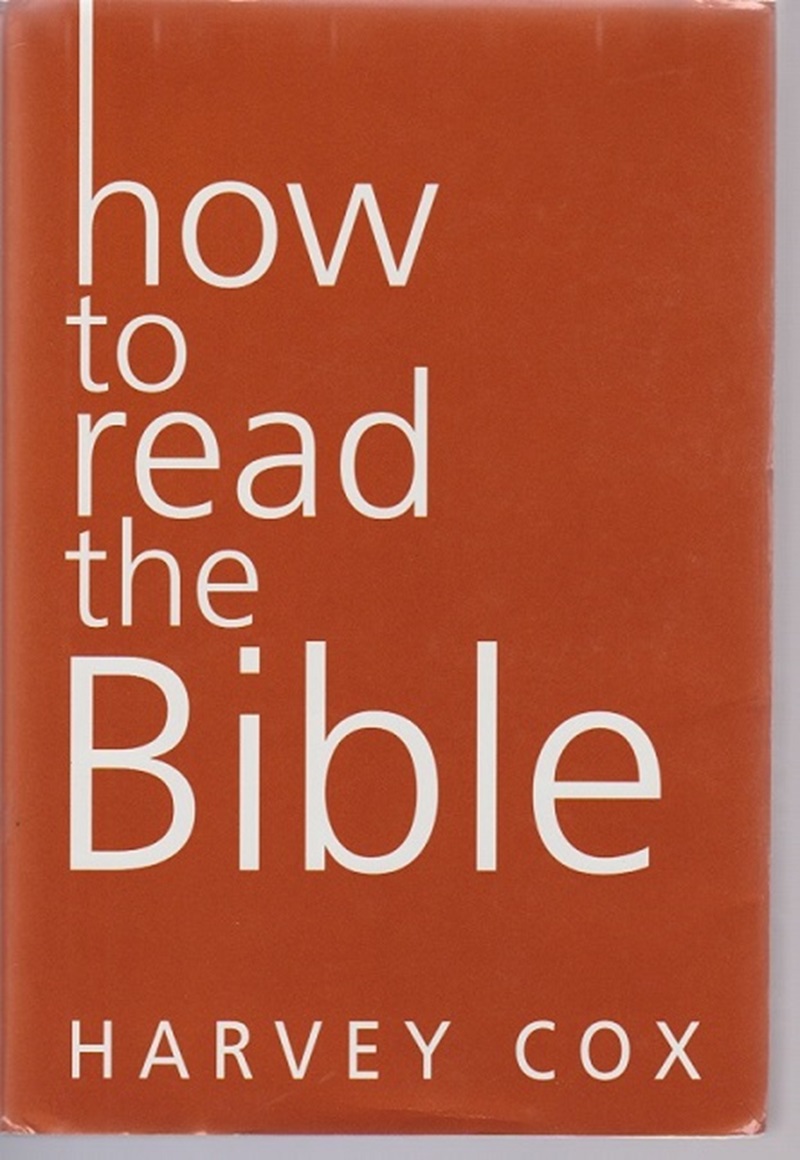
What captivated me about How to Read the Bible was its description of biblical books as literary works that were created by authors who, in addition to their spiritual and theological preoccupations, also were crafting, as artfully as possible, a poem or a story.
In other words, they were storytellers like Homer or Edith Wharton or Shakespeare.
This sort of juxtaposition of religious faith and art has always attracted me, and, as I read the Cox book, I noted several books mentioned in his text that I ordered and got around to reading as well, including The Book of ‘Job’: A Biography by Mark Larrimore and The Poets’ Jesus: Representations at the End of a Millennium by Peggy Rosenthal.
Lives of Great Religious Books
The very good Rosenthal book didn’t spark anything else in particular, but the Larrimore book certainly did.
It was published as part of a series from Princeton University Press, titled Lives of Great Religious Books, each of which looks at some great spiritual work and that work’s impact on world culture. While these scholarly yet buoyantly written books of 200 pages or so deals, of course, with theology, their greater emphasis is on politics, art and history. Indeed, they are marketed as biographies of these great works.
Well, I was so beguiled by Larrimore’s book on Job that I’ve read fourteen other books from that series, and written about several of them, including The Talmud: A Biography by Barry Scott Wimpfheimer, The Book of Genesis: A Biography by Ronald Hendel, The Song of Songs: A Biography by Ilana Pardes and ‘The Koran’ in English: A Biography by Bruce B. Lawrence.
Those books from the Princeton series led, in turn, to other books. Because I’d read the Larrimore book, I was quick to obtain and read the recently published Job: A New Translation by Edward L. Greenstein. The Pardes book had a few pages on Morrison’s Song of Solomon, so, soon after finishing the one, I gobbled up the novel.
R. Crumb and Robert Alter
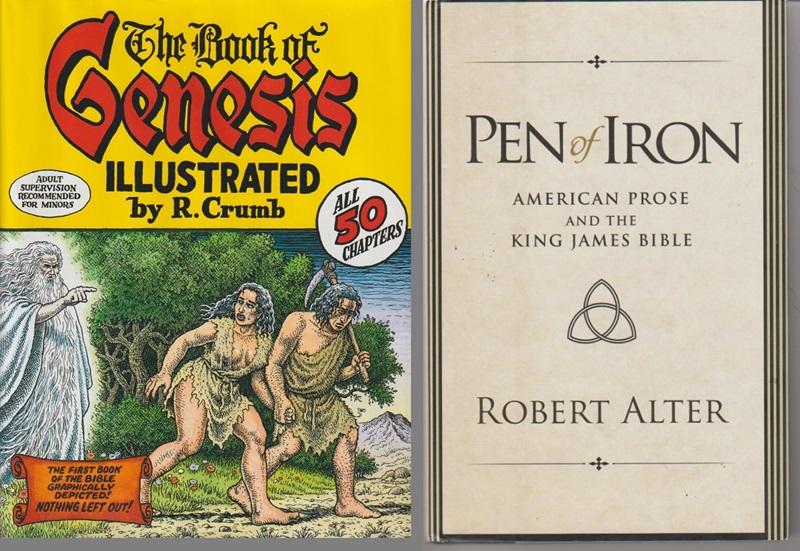
And the Hendel book led me to the totally unexpected The Book of Genesis, illustrated by none other than R. Crumb, that 1960s counter-cultural, in-your-face founder of the underground comix movement and creator of Fritz the Cat. An atheist, Crumb reproduced the entire text of the Bible’s first book and, in his own peculiar way, illustrated it in a reverent fashion, if still with a lot of very buxom women and more than a few nudes.
The text Crumb used was the translation by Robert Alter who was also mentioned in the Harvey Cox book and became one of my favorite writers on the Bible as literature.
Over a 20-year period, he translated the entire Hebrew Bible, and I’ve started to read the various installments. I’ve also enjoyed his work on the art of biblical narrative and the art of biblical translation, but perhaps my favorite is his 2010 Pen of Iron: American Prose and the King James Bible.
This is Alter’s examination of how the words, rhythms, techniques and literary aims of the King James Version have permeated American literature, influencing Abraham Lincoln’s Second Inaugural Address and Rev. Martin Luther King Jr.’s I Have A Dream speech, and writers ranging from Marilynne Robinson to Cormac McCarthy to Ernest Hemingway.
The bulk of Pen of Iron has to do with how the KJV enriched Seize the Day by Saul Bellow, Absalom, Absalom! by William Faulkner and — a book I soon read and relished — Melville’s Moby Dick.
Opening doors
How to Read the Bible turned out to open a lot of doors to a lot of fascinating and compelling books. I’m sure there have been other cases like this in my reading life that may have been just as rich but, for one reason or another, I didn’t realize were happening. And in your reading life, too, I suspect.
And the wonderful thing is that it doesn’t have to end. I’m looking forward to other biographies of great religious books from the Princeton series and to other translations and books by Alter. And other spinoffs and offshoots from the Cox book.
And the ripples of that one book recommendation continue to roll.
Patrick T. Reardon
5.13.24
This essay originally appeared in the Chicago Tribune on 2.16.20.
The list of ripples, three years after a book recommendation
“How to Read the Bible” by Harvey Cox — https://patricktreardon.com/book-review-how-to-read-the-bible-by-harvey-cox/
“The Book of ‘Job’: A Biography” by Mark Larrimore — https://patricktreardon.com/book-review-the-book-of-job-a-biography-by-mark-larrimore/
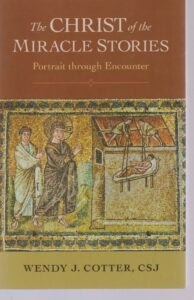 “The Christ of the Miracle Stories: Portrait through Encounter” by Wendy Cotter CSJ — https://patricktreardon.com/book-review-the-christ-of-the-miracle-stories-portrait-through-encounter-by-wendy-cotter-csj/
“The Christ of the Miracle Stories: Portrait through Encounter” by Wendy Cotter CSJ — https://patricktreardon.com/book-review-the-christ-of-the-miracle-stories-portrait-through-encounter-by-wendy-cotter-csj/
“Mere Christianity” by C.S. Lewis — https://patricktreardon.com/book-review-mere-christianity-by-c-s-lewis/
“C.S. Lewis’s ‘Mere Christianity’: A Biography” by George M. Marsden — https://patricktreardon.com/book-review-c-s-lewiss-mere-christianity-a-biography-by-george-m-marsden/
“The Poets’ Jesus: Representations at the End of a Millennium” by Peggy Rosenthal — https://patricktreardon.com/book-review-the-poets-jesus-representations-at-the-end-of-a-millennium-by-peggy-rosenthal/
“The “Dead Sea Scrolls”: A Biography” by John J. Collins — https://patricktreardon.com/book-review-the-dead-sea-scrolls-a-biography-by-john-j-collins/
“ ‘The Koran’ in English: A Biography” by Bruce B. Lawrence — https://patricktreardon.com/book-review-the-koran-in-english-a-biography-by-bruce-b-lawrence/
“The ‘Book of Genesis’ – a Biography” by Ronald Hendel — https://patricktreardon.com/book-review-the-book-of-genesis-a-biography-by-ronald-hendel/
“Ecclesiastes” from “The Wisdom Books,” translated by Robert Alter with commentary — https://patricktreardon.com/book-review-ecclesiastes-from-the-wisdom-books-translated-by-robert-alter-with-commentary/
“Pen of Iron: American Prose and the King James Bible” by Robert Alter — https://patricktreardon.com/book-review-pen-of-iron-american-prose-and-the-king-james-bible-by-robert-alter/
“The Art of Biblical Narrative” by Robert Alter — https://patricktreardon.com/book-review-the-art-of-biblical-narrative-by-robert-alter/
“The David Story: A Translation with Commentary of 1 and 2 Samuel” by Robert Alter — https://patricktreardon.com/book-review-the-david-story-a-translation-with-commentary-of-1-and-2-samuel-by-robert-alter/
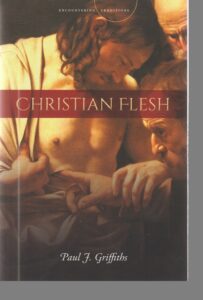 “The Tibetan Book of the Dead: A Biography” by Donald S. Lopez Jr. — https://patricktreardon.com/book-review-the-tibetan-book-of-the-dead-a-biography-by-donald-s-lopez-jr/
“The Tibetan Book of the Dead: A Biography” by Donald S. Lopez Jr. — https://patricktreardon.com/book-review-the-tibetan-book-of-the-dead-a-biography-by-donald-s-lopez-jr/
“Christian Flesh” by Paul J. Griffiths — https://patricktreardon.com/book-review-christian-flesh-by-paul-j-griffiths/
“The Book of Common Prayer: A Biography” by Alan Jacobs — https://patricktreardon.com/book-review-the-book-of-common-prayer-a-biography-by-alan-jacobs/
“The Hero with a Thousand Faces” by Joseph Campbell — https://patricktreardon.com/book-review-the-hero-with-a-thousand-faces-by-joseph-campbell/
“The Talmud: A Biography” by Barry Scott Wimpfheimer — https://patricktreardon.com/book-review-the-talmud-a-biography-by-barry-scott-wimpfheimer/
“As a City on a Hill” by Daniel T. Rodgers — https://patricktreardon.com/book-review-as-a-city-on-a-hill-by-daniel-t-rodgers/
“Moby Dick” by Herman Melville — https://patricktreardon.com/book-review-moby-dick-by-herman-melville/
“The Book of Genesis,” illustrated by R. Crumb — https://patricktreardon.com/book-review-the-book-of-genesis-illustrated-by-r-crumb/
“Sarah the Priestess: The First Matriarch of Genesis” by Savina J. Tuebal — https://patricktreardon.com/book-review-sarah-the-priestess-the-first-matriarch-of-genesis-by-savina-j-tuebal/
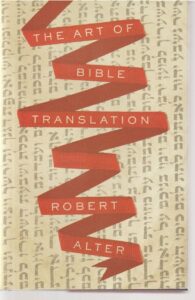 “The Art of Bible Translation” by Robert Alter — https://patricktreardon.com/book-review-the-art-of-bible-translation-by-robert-alter/
“The Art of Bible Translation” by Robert Alter — https://patricktreardon.com/book-review-the-art-of-bible-translation-by-robert-alter/
“The Book of ‘Exodus’: A Biography” by Joel S. Baden — https://patricktreardon.com/book-review-the-book-of-exodus-a-biography-by-joel-s-baden/
“Song of Solomon” by Toni Morrison — https://patricktreardon.com/book-review-song-of-solomon-by-toni-morrison/
“The Song of Songs: A Biography” by Ilana Pardes — https://patricktreardon.com/book-review-the-song-of-songs-a-biography-by-ilana-pardes/
“Job: A New Translation” by Edward L. Greenstein — https://patricktreardon.com/book-review-job-a-new-translation-by-edward-l-greenstein/
“Josephus’ ‘The Jewish War’ ” by Martin Goodman — https://patricktreardon.com/book-review-josephus-the-jewish-war-by-martin-goodman/
Written by : Patrick T. Reardon
For more than three decades Patrick T. Reardon was an urban affairs writer, a feature writer, a columnist, and an editor for the Chicago Tribune. In 2000 he was one of a team of 50 staff members who won a Pulitzer Prize for explanatory reporting. Now a freelance writer and poet, he has contributed chapters to several books and is the author of Faith Stripped to Its Essence. His website is https://patricktreardon.com/.
